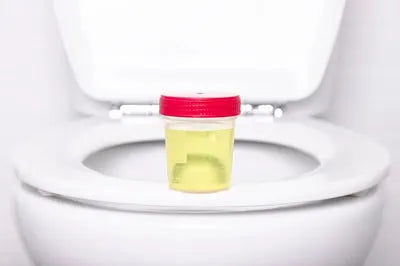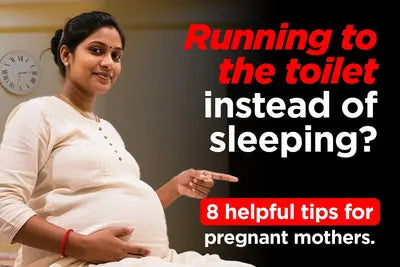All You Need to Know About Postpartum Bleeding
The first period you get after pregnancy is known as the postpartum period. It is generally very heavy, and you only get it about six to eight weeks later.
If you haven’t gone through a pregnancy ever, what you might be unaware of is that women experience heavy bleeding right after their pregnancy, too; yep, not a period. Blood flow and vaginal discharge are quite normal postpartum.
The blood will be heavy, and you might find big clots in it, too, don’t be alarmed.
This blood will slowly turn into a white, clear discharge called lochia.
This shedding of blood tissues from the vagina will keep happening until all the excess uterine lining and placenta are shed off. A few ways to determine if you need medical intervention is by inspecting this vaginal discharge called lochia. Here’s how:
Lochia has a “sweet smell” because of the shedding of leftover tissues from the pregnancy.
- Lochia is only bright red and heavy within a week of pregnancy
- Lochia doesn’t increase or decrease as per your bodily activities
If you notice things that go against these general rules, you should visit a doctor immediately.
When to See a Doctor for Postpartum Bleeding
Generally, postpartum bleeding is nothing to worry about. It begins after delivery and is a process where your body gets rid of any excess tissue, mucus, or blood left. So, there is no need to see a doctor until you notice any of the following signs or symptoms:
- Maternity padsare soaked within two hours
- High fever (100.4 ° F or more)
- Vagina has a bad smell
- Continuous abdominal pain
- Swelling or redness in the incision area with discharge or bleeding
- Constipation after delivery
- Difficulty in urinating
- Constant headache
- Vision problems
- Symptoms similar to flu
- Vomiting or nausea
- Calves have swelling or pain
Remember that you will have to use postpartum pads for six to eight weeks after delivery. In the first 2 weeks, there is a continuous flow. It is replaced with spotting, and ultimately, it ends. But if there is constant heavy bleeding and you are using maternity pads after delivery beyond the normal routine, call your doctor. This can mean that your uterus might still have a pregnancy tissue that has to be eliminated.
What Are Maternity Pads?
If you have given birth or gone through a pregnancy recently, you should be using maternity pads. You might have been advised by your elders or friends to use sanitary pads, but you would like to explore your options, and there is no harm in that either.
Here in this blog, we give you a few reasons why the use of maternity pads might be your best choice for handling postpartum bleeding.
Maternity pads are engineered for the sole purpose of managing a higher quantum of bleeding post-pregnancy. You would feel constant wetness and irritation in your vulva after giving birth. The last thing you need is to contract any infections to make matters worse.
Using maternity pads after birth might be a good idea. It is because maternity pads use a softer material for their top; this ensures that women who have stitches are comfortable. Additionally, maternity pads are longer, thicker, and wider than normal pads because they need to catch all the heavy flow. The volume of blood post-pregnancy increases by 30-50 ml.
It is recommended to change pads often to prevent any irritation or chances of infections to the inflamed skin of your vulva. Stack up on maternity disposable pads in advance so you are free of the worries of running out.
It might be hard for you to find maternity pads in the market that are of good quality because not many companies cater to the needs of women post-pregnancy. The babies usually take centre stage in terms of love, care, and hygiene. Your health is just as important; take care not to neglect it.
You can save yourself the hassle of having to browse and experiment with products in the market by opting for Friends Maternity Pads. We ensure quality that cannot be matched in any way. Friends Maternity Pads are:
- Ultra-soft and super-absorbent
- Entirely chemical-free to prevent any sort of added irritation
- Free of plastic coverings or ridges
- Chemical-fragrance-free and thus gentle on sensitive regions
- Contains high-quality Super Absorbent Polymer (SAP), which instantly soaks up the liquid and locks it in gel form
- Friends Maternity Pads are available in a Sticker Strip design and with Elastic Loops
What to Look for in Postpartum Pads?
The most important thing new mothers need is care and relaxation. There are several factors to keep in mind while choosing maternity pads for new moms.
-
Absorbency:
-
Extra-coverage:
-
Softness:
-
Chemical-free:
Choosing the right maternity pads after delivery is a crucial decision. Consider the factors discussed above and buy Friends Maternity Pads for your postpartum recovery.
How to Use Maternity Pads?
Friends Maternity Pads with Sticker Stripe Design can be used like regular sanitary pads, meaning they can be stuck onto your underwear. It is recommended to use this design of the maternity pads a few weeks after the pregnancy since the fabric of your underwear can be a little irritating to the vulva immediately after pregnancy.
Friends Maternity Pads with Elastic Loops are ideal to be used after pregnancy. They don’t require you to wear underwear. They come with elastic loops around your thighs like regular underwear but are much softer and thinner. These elastic loops hold your absorbent pad from the front and the back ends to prevent them from being misplaced or sliding off.
We hope that you are now equipped with all the knowledge you need to make the switch from regular sanitary pads to maternity pads for your heavy postpartum bleeding.
Conclusion
Maternity pads play a vital role in providing comfort and protection during the postpartum period. Understanding how to use them and what to look for in postpartum pads ensures optimal care. Remember, quality maternity pads are for your well-being, offering the support you need during this special time. Choose Friends Maternity Pads for comfort, care, and a healthy postpartum journey!
FAQs
When should I start using maternity pads?
Maternity pads are typically recommended to be used immediately after giving birth when you begin experiencing postpartum bleeding. These specially designed pads offer superior absorption, ensuring maximum comfort and hygiene during the initial postpartum period.
Should I buy maternity pads?
Yes, you should surely purchase maternity pads before giving birth. Maternity pads for new moms are specifically designed to handle the heavy flow of postpartum bleeding, and as they are softer and longer than regular pads, with huge soaking capacity, they provide extra comfort during this period.
Do maternity pads absorb urine?
Along with handling postpartum bleeding, maternity pads are also effective in absorbing urine, addressing the common issue of incontinence that some new moms may experience during the postpartum period.
Do I need maternity pads after a C-section?
Yes, maternity pads are necessary after a C-section. While the bleeding after a C-section may be less than a vaginal delivery, it is still a significant amount. Friends Loop Style Maternity Pads provide the required absorbency and coverage and last upto 6-8 hours.
How many maternity pads do I need per day?
If you need to change delivery pads every four hours, you'll need at least six pads daily. During four weeks of bleeding, you'll use approximately 150 pads. It is recommended to get 2-3 packets of maternity pads in advance to avoid the hassle of repurchasing every now and then.
How do I know what size maternity pad to buy?
Maternity pads come in different sizes, and choosing the right size depends on your comfort and the level of postpartum bleeding. It is always advisable to choose longer pads with high absorbency if bleeding and discharge are heavier immediately after giving birth.
















